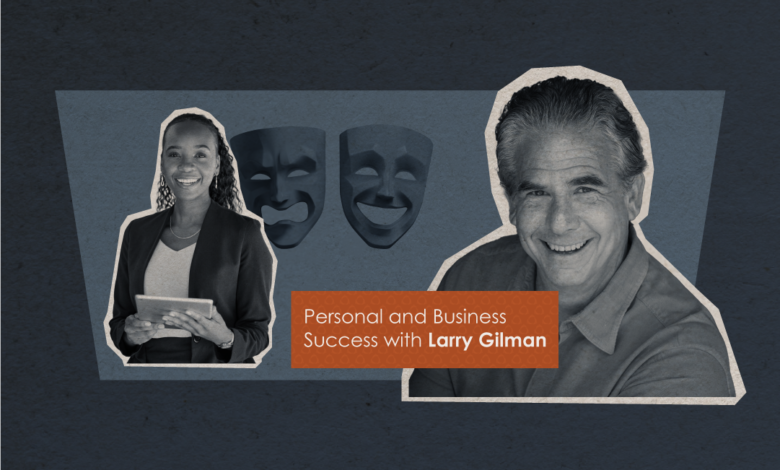Unlocking Employee Individuality with Larry Gilman

Related:
Communication, Public Speaking, and Leadership in Business
“Certainly some people are born with the gift of gab but anybody can become a public speaker,” says Camilla Burgess, Founder, CEO, and Coach at … Read more
We all know that learning new hard skills is a big component of professional development, but what about the softer aspects of good leadership and management? Are expression, creativity, and individuality key aspects of success? What about a willingness to fail? Can those traits be learned? Unlocked? Larry Gilman believes the answer is yes to all of the above. That’s why he has been leading Mastery Workshops since 1982.
“Most of us have masks and layers that we’ve built over the years,” says Gilman.1 “If we can remove the filters through which we see life, we’ll experience ourselves in a brand new way, which is extraordinary. Employees who are allowed to be creative will thrive.”
Teaching Presentation and Expression Skills in a Safe Environment
The veteran actor/director’s credits include such fan favourites as Final Destination, Cool Runnings, and M*A*S*H. These days he’s just as busy with, and just as passionate about, the Mastery Workshops. Based in Los Angeles, he’s been bringing the workshop to Vancouver since 1982. He now visits twice a year.
The program features exercises designed to foster presentation and expression skills, connectivity, and creativity.
“The different exercises may scare the crap out of people initially, but the participants don’t die, nor do they fall apart,” remarks Gilman. “My goal is to create a safe space where people aren’t afraid to fail.”
He believes that acting and directing provide a solid basis for forming leadership skills.
“These experiences give you freedom and permission to add elements of yourself into the role, rather than adhering to a certain image of what a leader should be,” he explains. According to Goldbeck the supportive group environment makes the exercises fun while still being challenging.
The Importance of Creativity in the Workplace
Gilman believes that creativity and expression are valuable workplace assets, but finds that they are often under-utilized, or even discouraged.
“A lot of people are hired for their intelligence or capabilities, but the company doesn’t want them to truly see or experience the company as it is, because this can lead to disruption,” he says. “This mindset can kill creativity and stifle insights.”
Among those who have participated in the Mastery Workshops is Henry Goldbeck. The Goldbeck Recruiting Inc. President found value in the exercises and agrees that personality should be nurtured in the workplace.
“The more we express our individuality, the more we actually connect with other people, which increases our value as both leaders and team members,” says Goldbeck.2 “The opposite would be to pretend to be something we’re not.”
The Challenge of Unlocking Creativity
Gilman acknowledges that peeling back the layers that block us from truly expressing ourselves can be a scary endeavour. Nonetheless, he aims to do just that in his workshops.
“Finding ourselves involves breaking free of things that have been imposed upon us through societal and familial structures,” says Gilman. “We must ask ourselves what is actually ours and what has simply been handed to us. The process is worthwhile as it allows us to discover our own unique philosophies, ethics, and morals.”
According to Goldbeck, the workshop is effective in this regard.
“A lot of the exercises involve helping us clarify what we actually want to say, as opposed to what we think we should say,” he says.
Is Failure a Part of Success?
It’s often said that failing presents us with an opportunity to learn. Gilman believes this to be true. According to him, the refusal to take risks leads to the stifling of creativity. That’s why he has workshop participants perform a song or monologue. Many are nervous about getting it right, but Gilman insists that that’s the point.
“I want people to enjoy their presentation rather than judge themselves,” he says. “People choose a song and then expect to perform it as well as Bruce Springsteen or Beyoncé. That’s crazy! Those artists have spent 30,000 hours practicing and you’ve spent a few moments.”

According to Gilman, our insistence upon being great at everything that we do damages our curiosity and prevents us from jumping into things.
“When Iacocca took over at Chrysler he saw that engineers were only failing 10% of the time,” says Gilman. “This indicated that they weren’t looking for new discoveries. Iacocca knew that and encouraged a change in attitude.”
Goldbeck echoes this sentiment.
“If you’re not failing, you’re not trying,” he says. “Obviously common sense must prevail and this shouldn’t be seen as an excuse to make careless mistakes, but staff should not be afraid to fail by taking calculated risks.”
Motivating Employees By Treating Them as Individuals
Gilman says that he’s travelled the world, presenting the workshop to people from companies big and small. In all cases, he thinks that people make the difference.
“From multi-billion dollar companies to start-ups, the greatest asset you have are the people who work with you,” he says.
He believes that treating your employees like individuals is the best way to maximize them as assets.
“People will do their jobs regardless,” he says, “but if they don’t feel valued, they won’t do that extra 2-3% that’s required to make sure it’s done properly. They won’t feel ownership.”
According to Gilman, each of us yearn to break out in one way or another and it’s never too late to start.
“Most people have never had the experience of someone actually supporting them as they are,” he says. “We can start at age 18, 30, 50, or 70, it doesn’t matter.”
Cited Sources
1 Direct communication with Larry Gilman
2 Direct communication with Henry Goldbeck
Source link